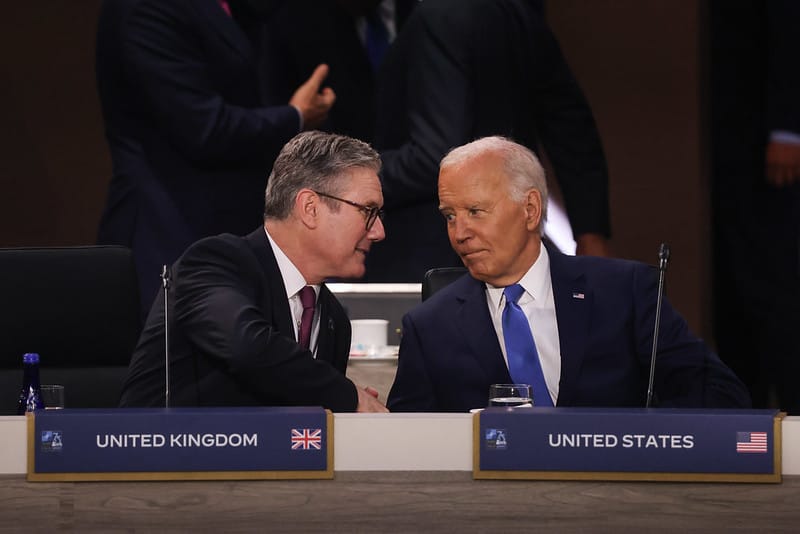Maybe Keir remembered he’s a human rights lawyer?
Assessing Labour’s week of Palestine policy

On the heels of a busy few weeks in American politics, Keir Starmer refocused the spotlight on British news with an eventful week of his own. Some decisions, like inexplicably suspending seven Labour MPs who voted to scrap the two child benefit cap, were terrible. In the haze of an assassination attempt, a volatile convention, and a presidential drop-out, it is easy to forget that a politics of radical tepidness can rest on great cruelty towards the most vulnerable and authoritarianism in the face of dissent.
More positive, however, has been the British state’s refamiliarisation with the concept of Palestinian human rights (just as the Jewish Chronicle feared).
On 19 July, Foreign Secretary David Lammy announced that the UK will restart funding to the UN Relief and Works Agency (UNRWA), the primary agency responsible for humanitarian aid and social services in Gaza. Lammy’s decision undoes the Conservative government’s January funding freeze which followed Israel’s unsubstantiated allegations of UNRWA staff participating in the 7 October attacks. The UK joins UNRWA’s other state supporters in resuming aid, leaving the United States as the only country to maintain its pause on funding.
Then, late yesterday, Middle East Eye reported that the UK is “likely to introduce restrictions on arms sales to Israel” and “is also expected to drop its objection to the International Criminal Court’s (ICC) arrest warrant for senior Israeli leaders”.
The UK has resisted demands for an arms embargo for months, and Lammy himself refused to commit to banning arms sales to Israel before the election, ignoring calls from London Mayor Sadiq Khan and Scottish Labour leader Anas Sarwar. More recently, Lammy’s much maligned visit to Israel and noxious photo-op with Benjamin Netanyahu did not exactly portend a break with existing policy.
MEE suggests that the shift is likely a response to a review of Israel’s compliance with international humanitarian law. The review, ordered by Lammy, is still underway, but appears likely to conclude that the UK may be breaking international law by continuing arms sales to Israel, which, of course, we all already knew.
The UK’s reported decision to drop its objection to the ICC issuing an arrest warrant for Netanyahu is perhaps the most surprising move, given recent reports of US lobbying efforts to maintain the previous position. With the UK out of the way, the ICC would be able to more quickly decide whether an arrest warrant can indeed be issued, without first having to hear arguments from the British government’s lawyers.
While any international human rights approach comes with attendant limitations, these are undeniably steps that get the UK closer to the bare minimum level of acceptable action in Gaza.
However, rather than simply accepting these measures as gifts to the Palestinian cause for which we should all be grateful, it’s worth taking a closer look at what we know and where there's room to demand more.
Questions remain
A number of still-to-be revealed details will determine whether the arms suspension is superficial or sincere. For example, we don’t yet know whether the ban will apply to all military exports. MEE indicates that the restrictions are likely to be only on offensive weapons. As the Campaign Against Arms Trade warns, it is crucial that the UK components for the F-35 and F-16 jets are included in any suspension, as these aircraft are currently dropping bombs over Gaza. The UK imposed a total ban on its weapons going to Israel in 1982-83, following the start of the Lebanon War, and we should push for similar action now.
We must also be aware of the inadequacies of other recent arms suspensions. Canada, for instance, sought to portray its February 2024 embargo as “a real thing”, only for journalists to uncover that it did not in fact apply to pre-existing licences. Previously approved contracts, which had not then been fulfilled, were subsequently delivered to Israel in the midst of genocide.
Canada also announced that it had purchased tens of millions of dollars worth of Israeli Spike missiles, weapons which have gained fame on the arms market via their use on Palestinians in Gaza. Current reporting makes no mention of Labour considering a two-way arms embargo, but it is essential that the British government ceases purchases of any Israeli weapons, and especially those tested during a genocide.
Questions remain, too, about the renewal of UNRWA funding. The UK will send a total of £21 million to the agency, to be split between core funding and a Gaza and West Bank flash appeal. There is no indication the UK will make further payments this year, and it is notable that this figure is nearly £14 million less than the UK government sent to UNRWA in 2023, under a Conservative government, which included a £16 million “uplift” following 7 October. The Labour government is essentially providing a pre-7 October amount of funding, despite the complete transformation in conditions on the ground (due in part to the UK’s own complicity) and the exponentially greater need for resources now than when the “uplift” was sent.
The UK’s pledged amount is also less than that offered by countries with similar or smaller economies. France, for instance, will send over €30 million (£25 million) over the course of the year, and Sweden will provide 400 million kronor (£29 million). It is of course positive that the UK has resumed its funding, but given the scale of death, destruction, and famine in Gaza, this is not enough.
A Break with the US?
Taken together, the week’s three measures suggest the possibility that this Labour government may not tow the American foreign policy line in absolutely every instance. This is a somewhat unexpected development, particularly under the leadership of a Tony Blair-style Atlanticist, who worked tirelessly to protect US interests abroad during the wars in Iraq and Afghanistan while leading the Crown Prosecution Service. Even with these momentary deviations, there remain strong economic incentives for the UK to support the US war machine at every opportunity.
From the beginning of this year, UK businesses – from shipbuilders to weapons component manufacturers to miners of raw materials – have for the first time become eligible to receive direct assistance from the US government to help expand US defence production capacity and to secure supply chains.
Specifically, the US has designated the UK (and Australia) as “domestic sources” for the purposes of the US Defense Production Act (DAP), allowing the US to provide “loans, loan guarantees, purchase commitments, equipment, and related U.S. government assistance” to businesses in these countries.
This designation emerged from former Prime Minister Rishi Sunak’s summer 2023 meetings with President Joe Biden, resulting in The Atlantic Declaration, a roadmap for closer US-UK economic cooperation. On the defence side, the UK received a commitment from Biden to request such a “domestic” designation from the US Congress, in order to strengthen the Australia-UK-US (AUKUS) defence partnership and generate new avenues for US investment in militarily strategic sectors of the British economy.
Biden’s follow-through has overlapped with blanket US financial and military support for Israel’s war on Gaza. Mere months after the UK received this designation, the US signed into law a controversial foreign funding bill providing $94 billion in total assistance for Israel, Ukraine, and Taiwan. The specific terms of the Israel portion of that bill earmarked almost $200 million for the Department of Defense to spend on purchases that fall under the domain of the Defense Protection Act.
This aspect of the bill was noted positively by the Jewish Institute for National Security of America (JINSA) – an influential neo-conservative think tank which has celebrated the IDF’s genocidal conduct in Gaza and previously advocated for “total war” against Arab regimes. Its briefing on the funding package contends that these funds will help keep Israel well-stocked for whatever is to come in the years ahead.
British businesses are now especially invited to join the US war machine and realise this murderous vision of the future, in Palestine and wherever else the American empire takes them. As Starmer and Biden call for even deeper economic cooperation between the two countries, it’s important to keep sight of the challenges ahead, and to reflect on how partnership with the US allows the UK to flex its old imperial might, while professing to uphold human rights worldwide.▼
Evan Robins is an editor at Vashti.
There’s no corporation or big advertisers behind Vashti – we're a workers' cooperative and rely on small donations to keep running. Support our journalism to help break the consensus.




